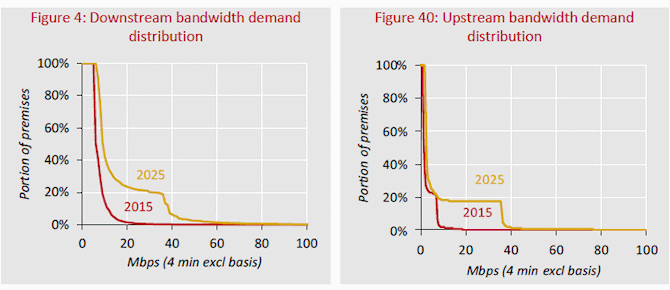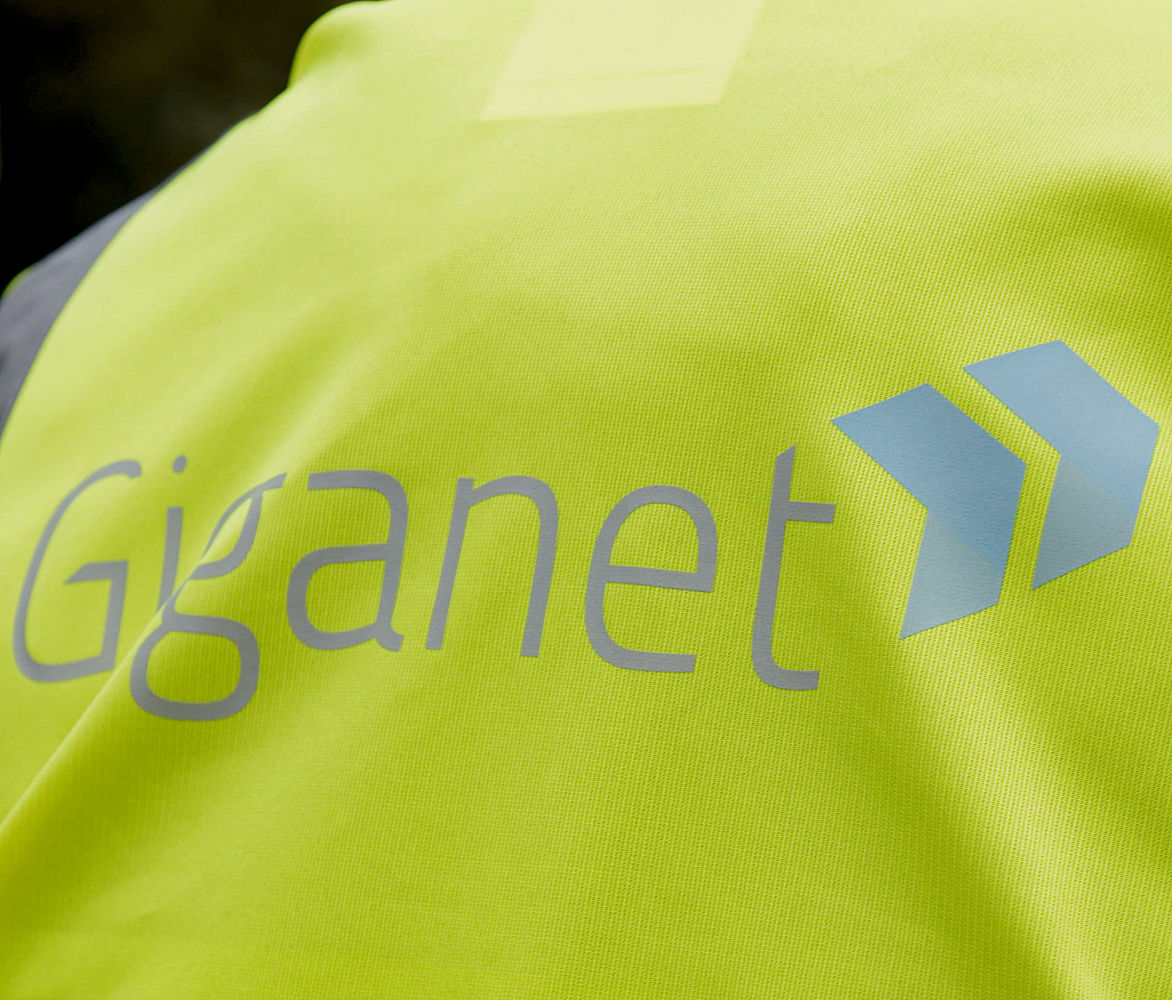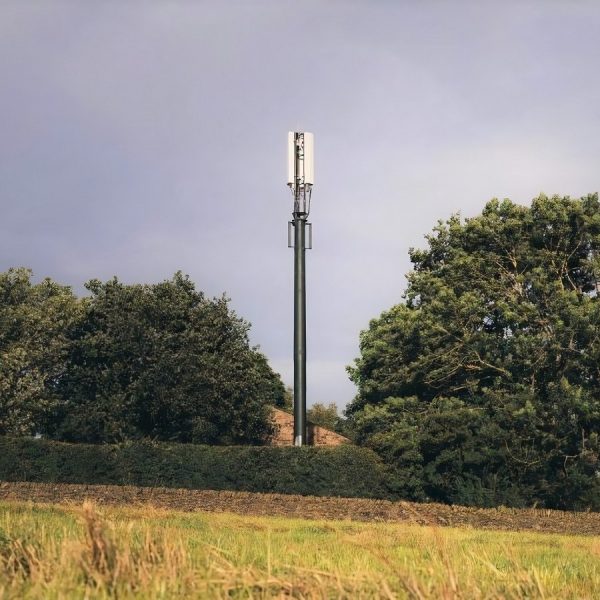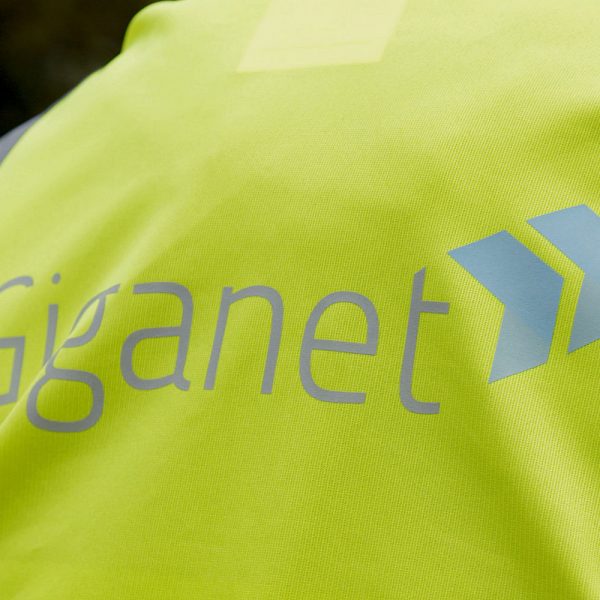SMEs to See Median Broadband Speed Demand of Just 8.1Mbps by 2025
The Broadband Stakeholders Group, which advises the Government on broadband matters, has published a new report that aims to predict the future requirements of small UK businesses (SMEs). The conclusion finds that SMEs will see median downstream demand rise from 5Mbps in 2015 to just 8.1Mbps by 2025, but the overall picture is more complex.
Rarely a month seems to go by without business groups (e.g. FSB) warning that the country’s current broadband infrastructure still isn’t capable of meeting their future needs, with many continuing to complain of poor connectivity, performance woes and of being missed out by the Broadband Delivery UK roll-out. At the same time many businesses are benefitting from new connectivity, but the picture is mixed.
In that sense it might rightly surprise some readers to find that the BSG’s new report is predicting that the median download speed demand for small business premises will rise from 5Mbps in 2015 to just 8.1Mbps in 2025, while demand for the 95th percentile will rise at a seemingly more respectable rate from 12.9 Mbps to 41.1Mbps over the same period.
Similarly upload speed can also be very important to businesses, although the BSG predicts that median upstream premise demand is currently only 1.2Mbps and that rises to 7.2Mbps for the 95th percentile; by 2025 both of these will rise to 2.3Mbps and 36Mbps respectively.

So far, so slow. However the BSG’s study points out that small businesses are a very diverse bunch and their usage patterns tend to vary depending upon the nature and size of the business. For example, over 90% of the firms have between just 0-4 employees and the BSG claims that this puts the 5Mbps estimate “in line with industry rules of thumb of under 1Mbps per employee” (we’ve not seen that before).
On top of that the study notes that approximately half of small business employees should be classified as “low users“, with limited professional reason to be online at work (i.e. not all employees actually use or need Internet access while at work). Likewise often those that do go online may only require basic email and web access.
Put another way, somebody working underground in a coal mine, gardening or collecting rubbish won’t have particularly high data demands, if any at all, and all of this weights into the assumptions. For example, one person food manufacturers were found to require just 6Mbps downstream by 2025, but a 49 person software business will need 193Mbps by the same date.

At this point the BSG admits that their model makes a “number of assumptions that are open to interrogation” (e.g. assumptions about the applications used by employees and visitors), although it also uses data from known sources and studies of actual usage and behavior (e.g. Ofcom).
In conclusion the BSG dubiously states that, as of 2015, “average ADSL is sufficient for the downstream needs of 91% of small business premises“. However the report bases this on ADSL’s average download speed of around 11Mbps and 1Mbps upload, which they admit is far from perfect because ADSL is notorious for suffering “significant variation” in its service speeds.
For example, Ofcom’s research found that 24% of premises in SME-only postcodes had broadband speeds of less than 5Mbps. On top of that the BSG also notes that ADSL provides sufficient upstream bandwidth for “only a minority of small businesses” (43.7%) and this is sensitive to some of the model’s assumptions (e.g. it rises to 49% if BitTorrent P2P is excluded).
But just because many business may only have lower bandwidth requirements doesn’t mean to say that the infrastructure we build must only cater to the lowest common denominator, particularly given that the 95th percentile / larger firms are likely to generate a greater proportion of the overall wealth and these can exist in both urban and rural areas.
Report Extract
Turning to superfast technologies, both FTTC and DOCSIS 3.0 appear to be sufficient for virtually all small businesses today. By 2025, their upstream capabilities will be inadequate for the (unconstrained) demand of a little under 20% of small businesses.
However by 2025 next generation technologies such as G.fast and DOCSIS 3.1 (being tested today by BT and Virgin respectively) are likely to be deployed. These, along with FTTH, will each have ample capacity to meet our forecast demand, in the areas where they have been rolled out.
Today, the model suggests that 14% of small business employees work in premises requiring more than 20 Mbps – for this group, even good ADSL is unlikely to be adequate. By 2025 approximately half of employees will work in such premises. This highlights the importance for small businesses of FTTC, G.fast, HFC, FTTH and other technologies which can deliver faster speeds than ADSL.
The key wording above is “in the areas where they have been rolled out“, since at present there seem to be no plans for taking any of the future new technologies much beyond the existing commercial footprint (around 60-70% of UK coverage). Admittedly some FTTH/P providers are reaching into rural areas, but their overall impact in that final 30-40% is very small.
However the BSG suggests that the diversity of small business requirements perhaps “argues against a one-size-fits-all for broadband provision” and adds that “an intervention to (say) provide 100Mbps for all would represent a substantial overprovision for most such businesses“, which will no doubt please the Government to hear.
Matthew Evans, CEO of the BSG, said:
“This report greatly adds to our understanding of small businesses connectivity requirements. Although standard broadband is adequate for most firms, some firms are already constrained. All small businesses will need access to superfast speeds in the next five years, and large numbers will soon need the ultrafast speeds that the Government committed to delivering in the recent Productivity Plan.”
At this point it’s probably a good idea to note the limits of the model’s scope, which is focused on being a forecast of technical bandwidth requirements. However businesses may choose to buy more or less bandwidth than they technically require and other product characteristics, such as service levels, usage allowances, reliability and latency, haven’t really been given much or any consideration.
For example, you could in theory cater for a lot of small business requirements by using Satellite, but this won’t work for everybody where the usage limits, rental costs and latency constraints might create problems. On the flip side we must also consider that a lot of smaller firms might perhaps expand faster and become more prosperous if they are able to access even faster connectivity than exists today.
Small businesses ultimately provide 39% of UK employment and 32% of UK turnover. Related businesses are also heavily skewed to the private sector, and thus provide 48% of UK private sector employment. As such we should perhaps be aiming to deliver the best forms of connectivity so that no firms are left at a disadvantage.
Mark is a professional technology writer, IT consultant and computer engineer from Dorset (England), he also founded ISPreview in 1999 and enjoys analysing the latest telecoms and broadband developments. Find me on X (Twitter), Mastodon, Facebook and Linkedin.
« 40941 Businesses Take Broadband Connection Vouchers – Breakdown by City
South Yorkshire ISP Origin Broadband Hails Growth Spurt »
Latest UK ISP News
- FTTP (5515)
- BT (3514)
- Politics (2537)
- Openreach (2297)
- Business (2262)
- Building Digital UK (2244)
- FTTC (2043)
- Mobile Broadband (1973)
- Statistics (1788)
- 4G (1664)
- Virgin Media (1619)
- Ofcom Regulation (1461)
- Fibre Optic (1395)
- Wireless Internet (1389)
- FTTH (1381)
























































Comments are closed